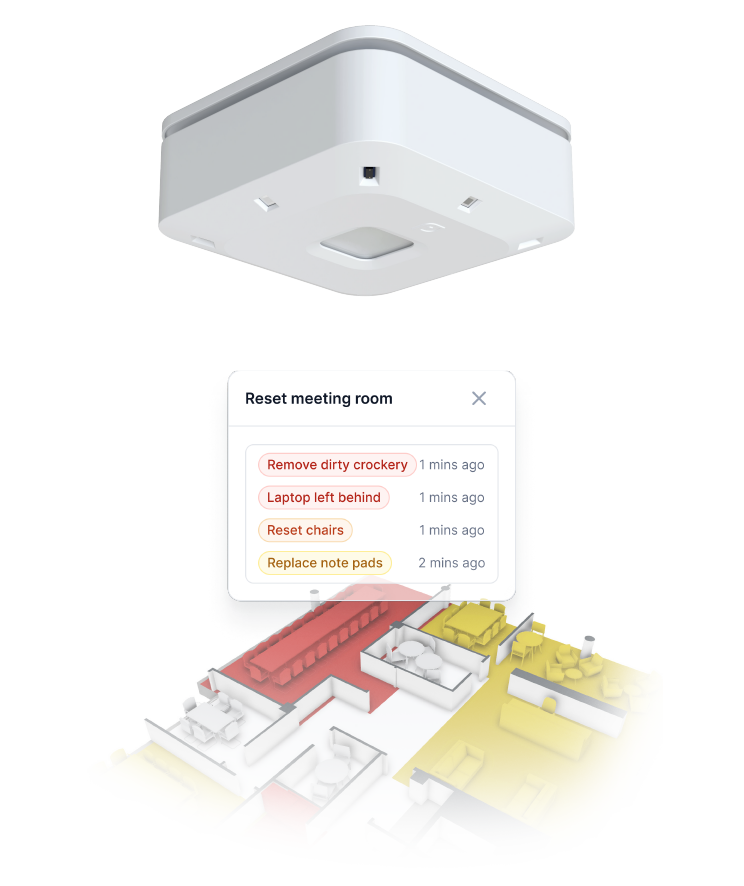
The data we harvest allows us to promote transformational efficiency gains by decoupling wages from hours worked, and instead paying placemakers per task.
This is our mission: To unlock the engagement and initiative of placemakers, through meritocracy.
Core is the foundation of the system, allowing you to assign scheduled tasks to operatives onsite, and logging task completion.
Pulse enables demand-driven cleaning through low-cost feedback points that are easy to deploy.
Sense unlocks the power of smart buildings, IoT and AI to elevate your operations to an unprecedented level of automation and efficiency.
Merit will launch in 2025, introducing productivity based bonuses for low income operatives.

Effortless management of input specified services on an interactive digital twin of each building.
Core works on an interactive 3D model of the entire site, which Pego builds. The model is used to setup and customise tasks for each space in the building.
A real-time task list is delivered to cleaning operatives and building managers on their Pego mobile app.
The app guides operatives through their daily roster, allowing them to report on their progress. Managers can keep track of operations in real-time through the web dashboard, or the management version of the Pego mobile app.
Core sets the operational foundation upon which Pulse and Sense enable demand driven cleaning and automation.

How Core works:
Pego creates a digital model of your buildings, without charge.
Managers set the specifications.
Tasks are automatically scheduled and pushed to each operative’s mobile app.
Operatives complete tasks.
Clients get aggregated contract.
Managers get full log of task completion.
Pego monitors the contract delivery and proposes adjustments to the specifications, creating a cycle of continuous improvement.


On demand servicing based on live requirements from all stakeholders, focusing resources on outcomes that matter.
Ad hoc tasks and feedback can be submitted by building occupants scanning a QR code in a room, whilst managers can create tasks in real-time via the Pego dashboard. Operatives can also create tasks on the spot, using the Pego mobile app.
Tasks are automatically prioritised and merged into the live task list of the relevant operatives, with a push notification. This enables demand driven services, with teams being dynamically directed to the issues that matter the most.
Pulse can be integrated with third-party platforms such as IWMS room bookings, and messaging applications.

How Pulse works:
Pego installs simple feedback points (QR codes, NFC tags and/or wireless buttons) in the desired areas.
Anyone can use a Pego feedback point to send feedback or make a request.
Building managers can create instant tasks from the interactive building model.
Third-party feedback sources like FM mailboxes, messaging apps, and IWMS are also connected.
Pego’s AI organizes all the inputs and automatically converts them into live tasks that are pushed to operatives on the Pego mobile app.
If a human input (Pulse) task makes scheduled (Core) tasks redundant, the system automatically closes off the duplicated items, replacing input specified work with on demand services.




Sensor driven operations using IoT sensors and Reasoning AI, including Pego’s unique sensor Pods enabled with Computer Vision.
Sense takes on demand operations to the next level, utilising Smart Building data to identify tasks required to keep facilities running optimally.
The Pego platform is hardware agnostic. We can integrate with most workplace sensors, connect to existing platforms where you already collect Smart Building data, or bespoke an installation for your building using the most suitable devices for your specific goals.
Pego’s unique sensor Pods utilise computer vision coupled with Artificial Intelligence to identify tasks in real-time and push them to the dashboard and mobile app. In addition, the Pods accurately track footfall and flag high utilisation areas for more frequent servicing.
In addition to identifying visible issues using AI, the Pego Pods generate spatial intelligence data for occupancy, temperatures and space utilisation with unprecedented detail.

How Sense works:
Pego prepares a tailored IT installation for your buildings, with a mix of sensors that best match your specific business cases.
The Pego team manages the installation, setup and integration of all hardware (Pego and third-party).
The system can also be integrated with APIs of pre-existing technologies on site.
Pego analyses all data sources using AI to create tasks driven by Smart Buildings.
The Pego Pods utilise Computer Vision and reasoning AI to provide an unprecedented level of intelligence on the status of facilities.


Empower operatives by offering financial rewards based on clear productivity metrics
Merit creates simple user-friendly incentives to boost the productivity of operatives, based on individual performance metrics.
When part of a worker’s pay is tied to clear performance goals, they tend to produce substantially more, making Merit a win-win: Higher service standards at lower costs, whilst creating game changing social impact by lifting the real wages of hard working operatives.

How Merit works:
The Pego app automatically tracks operative task completion rates.
Reward levels and criteria for allocation can be configured by the service provider.
Operatives can track the rewards earned on their Pego app, at any time.
Pego can integrate with the service provider’s payroll and HR platforms, enabling the seamless delivery of rewards to operatives.


The Shell is a new layer of intelligence that brings transparency, structure, and full oversight to exterior building maintenance.
Facade cleaning is one of the most operationally risky and opaque services in facilities management. Often carried out by specialist subcontractors and executed at height, it lacks the real-time visibility, safety assurance, and documentation expected in modern property operations.
The Shell solves that. It digitises facade cleaning workflows, tracks subcontractor activity live, and gives facilities teams the power to manage exterior services with the same control they have inside the building.
With Shell, exterior maintenance becomes a managed and measurable process.
Create and share engaging, detailed reports on your progress and the state of the building - or allow clients to interact directly with the digital twin for full transparency.
Monitor SLA performance with automated logs and timestamped activity records.
Access real-time data and historical records for every clean. Improve accountability.
The Shell works seamlessly with your existing Pego solutions unifying interior and exterior operations on a single platform.



The world’s first Artifical Intelligence Machine Vision solution for facilities management.
Our sensor Pods monitor occupancy, footfall, spacial changes and surface temperatures, combining all the main workplace sensors in a single device.
They also include our unique Computer Vision, which provides unprecedented cleanliness and tidiness insights.

The Pods are mounted on the ceiling, using easy assembly plastic brackets provided by PEGO. All Pods require a Category 6 Ethernet cable for power. Connectivity can be provided by the same Ethernet cable or by WiFi.
The Pods use high-accuracy 8x8 pixel infrared thermal sensors, which can detect temperature variations within each pixel with 0.25°C precision.
Advanced proximity and ranging sensors provide highly accurate real-time distance measurements.
The shutter consists of a proprietary glass screen, which is opaque when at rest. When energised, the shutter becomes momentarily transparent, allowing the imaging device to capture an image of the vacant facilities.
The shutter conceals a camera, which is exposed to collect images only when spaces are vacant. Whenever someone is within range of the Pod, the camera cannot take pictures (and is not even visible).
The Pego Pods generate additional datasets that that are invaluable for the wider building services.
The cumulative utilisation of the areas of a building over a given time period, with unrivalled detail.
The temperatures of all areas monitored by Pego Pods and other sensors can be plotted as a heatmap, providing valuable independent insights on HVAC efficiency, energy savings, and comfort of occupants.
Reasoning AI analyses images of vacant spaces to determine their status, and any tasks that may be required to keep them clean, safe, and comfortable. Tasks are automatically assigned to the relevant teams.

If you have any questions or need any assistance please contact us below, and our team will help you setup your perfect system to achieve more efficient cleaning operations.
Let's talk